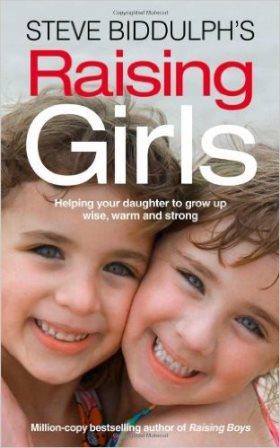
Girls are in the news – for all the wrong reasons.
Once upon a time, people worried rather a lot about boys; academically, they¬†were trailing behind girls; culturally, they were struggling to find a place to fit into the modern world.¬†In the last few years the media’s focus has shifted to the various pressures girls are under, which is why Steve Biddulph, author of ‘Raising Boys’, has now turned his hand to writing about girls.
What’s it about?
- The problems girls face today and how these differ from those faced by boys.
- How to raise girls who can resist social pressure and listen to their parents.
- Biddulph proposes there are five stages of girlhood and explains what each entails, suggesting each involves learning a key lesson. If this key lesson is not learned, it will impact negatively on future habits and lifestyle. (For instance, he suggests that people who didn’t get enough love in their mother’s arms become drug addicts.)
What’s it like?
Interesting. Worrying. Potentially controversial in places.
Bidduloh approaches the concept of becoming a girl from an evolutionary psychology perspective (which I know may alienate some people immediately!) and considers how the modern world is affecting primitive needs and responses.
Somewhat unfashionably, he advises taking time out of the pressured modern world to spend the first year or two with the baby, and his approach is similarly hands-on from thereon. He’s insistent that, ‘If you do parenthood even half well, it will rearrange your world.’ Controlled crying is unacceptable (it teaches learned helplessness and depression) and, whilst you should avoid becoming a martyr, your teenaged daughter should know that she can always call you at 3am if she needs to be picked up. Thrusting a tenner into her hand for a cab home later is seen as cavalier at best, irresponsible at worst. These are not stances that all parents will appreciate, and though Biddulph’s opinions are substantiated with some references to research, it is clear that these are his personal hobbyhorses, so don’t expect it to feel like a balanced argument!
If this insistence on completely rearranging your life to suit your children doesn’t depress you, the chapters on hazards still might. The horrors of the online world are spelt out and made me feel horribly na√Įve. I was already¬†aware of the existence of pro-suicide sites, but the notion of pro-ana and pro-mia sites was a new and revolting concept.* Similarly, while I’m familiar with the easy access to sexual content facilitated by the internet (note to self: never again google¬†‘girls struggling’ without further clarification), the proliferation of sexting among the very young was another shocker that had me vowing my daughter will not own a mobile until she is at least 13. Biddulph has suggestions to tackle these dangers of course, though I think they could mostly be distilled into one key piece of advice: focus on creating great relationships with your daughter. Everything else will follow.
Final thoughts
While I appreciate that girls have particular pressures placed on them, especially by the eruption of social media (you can be anything you want! as long as you’re gorgeous and skinny!), most of Biddulph’s advice was equally applicable to boys, and it’s hard not to shout ‘sexism!’ when he advocates giving girls a ‘craft room’ or other space to make things and giving boys a shed to, er, make different things. While this could be seen as a surrender to stereotypes, Biddulph argues that ‘in practice’¬†it is actually liberating and creates safe havens for girls.
Certainly this is in interesting read, especially in Biddulph’s discussion of the modern family and schooling system. Arguably, the school structure militates against inter-generational friendships, thereby encouraging youngsters to have only one friendship or peer group, which means there’re no alternative viewpoints and no opportunity to guide a younger child or learn from an older one. Similarly, the modern focus on the nuclear, as opposed to the extended, family has led to a decline in the number of girls (and boys) experiencing valuable aunt / uncle relationships with older adults whom they respect and can feel safe with outside their immediate circle. I can definitely see the value in encouraging my children to engage¬†with multiple friendship groups and with appropriate other adults.
Biddulph’s style is anecdotal and chatty and won’t suit all parents, but as a starting point for thinking about what children need from their parents, it’s worth reading.
‘Raising Girls’,
Steve Biddulph,
2013, HarperThorsons, paperback
* Pro-ana and pro-mia are websites dedicated to promoting anorexia and bulimia, with tips for how to really mess up your body. Frightening stuff.